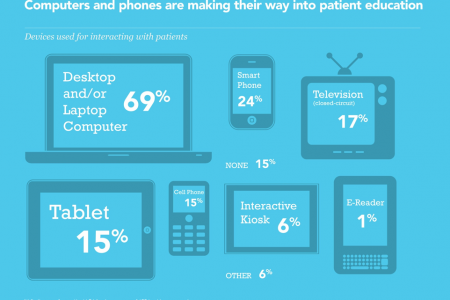
How Patients Learn In The Digital Age
How Patients Learn IN THE DIGITAL AGE We surveyed healthcare extenders*-non-MD healthcare professionals who work directly with and on behalf of patients-to learn how they are using technology to educate patients. 95% of healthcare extenders use printed handouts for patient education BUT HEALTHCARE EXTENDERS A majority of respondents refer patients to credible Web sites. are becoming the of extenders SEARCH ENGINES 82% in private practices of extenders 60% in outpatient clinics FOR PATIENTS of extenders 52% in hospital settings 59% say patients often or sometimes bring information from the Internet to discuss are concerned patients are often unable to find content that's reputable 30% "Patients trust information without verifying the source, are unable to decide which resource to use, and may be confused about the initial search technique to use." MN, registered dietitian, on the challenges her patients face when using technology little devices HAVE BIG 1 in 2 US adults has a smart phonet Potential 2 in 3 healthcare extenders surveyed have a smart phone yet only 1 in 4 healthcare extenders uses a smart phone for interacting with patients Almost 2 in 10 healthcare extenders USE a tablet for interacting with patients 3 in 10 healthcare extenders HAVE a tablet-a higher proportion than in the overall US population 6 in 10 healthcare extenders WISH they had a tablet computer to interact with patients 79% of healthcare extenders who use apps also report that technology improves the quality of interactions with patients How do you deliver patient education? HEALTHCARE EXTENDERS are using 44% online video (like YouTubeTM) DIGITAL 25% webinars CONTENT -especially videos WITH PATIENTS... 18% blogs 9% video chat ...because it makes a difference 64% of healthcare extenders believe that technology has impacted the quality of interactions with patients Only 3% report that technology causes distractions or obstacles use a PC for interacting with patients 69% TECHNOLOGY doesn't have to be print out online materials to use 55% CUTTING-EDGE with patients during a visit to be use e-mail for offective 29% communicating with patients between visits Interesting, but will all of it ever really take off? To qualify for financial incentives from the government, healthcare practices must show meaningful use of technology. That means meeting a set of criteria approved by the Centers for Medicare and Medicaid Services-one of which is the use of electronic health record (EHR) technology to identify and provide patient-specific education resources. As more practices roll out EHR, the merger of patient education and technology is primed for a big lift. Want to know more? Visit www.HealthEdAcademy.com to download our free report and presentation. "Unless otherwise stated, all findings are from a HealthEd Academy survey of 155 healthcare extenders, conducted in spring 2012. 'Device ownership for the US population is based on research by Pew Internet in January 2012 and March 2012. YouTube is a trademark of Google Inc. ©2012 HealthEd Academy, LLC. All rights reserved. HealthEd" ACADEMY How Patients Learn IN THE DIGITAL AGE We surveyed healthcare extenders*-non-MD healthcare professionals who work directly with and on behalf of patients-to learn how they are using technology to educate patients. 95% of healthcare extenders use printed handouts for patient education BUT HEALTHCARE EXTENDERS A majority of respondents refer patients to credible Web sites. are becoming the of extenders SEARCH ENGINES 82% in private practices of extenders 60% in outpatient clinics FOR PATIENTS of extenders 52% in hospital settings 59% say patients often or sometimes bring information from the Internet to discuss are concerned patients are often unable to find content that's reputable 30% "Patients trust information without verifying the source, are unable to decide which resource to use, and may be confused about the initial search technique to use." MN, registered dietitian, on the challenges her patients face when using technology little devices HAVE BIG 1 in 2 US adults has a smart phonet Potential 2 in 3 healthcare extenders surveyed have a smart phone yet only 1 in 4 healthcare extenders uses a smart phone for interacting with patients Almost 2 in 10 healthcare extenders USE a tablet for interacting with patients 3 in 10 healthcare extenders HAVE a tablet-a higher proportion than in the overall US population 6 in 10 healthcare extenders WISH they had a tablet computer to interact with patients 79% of healthcare extenders who use apps also report that technology improves the quality of interactions with patients How do you deliver patient education? HEALTHCARE EXTENDERS are using 44% online video (like YouTubeTM) DIGITAL 25% webinars CONTENT -especially videos WITH PATIENTS... 18% blogs 9% video chat ...because it makes a difference 64% of healthcare extenders believe that technology has impacted the quality of interactions with patients Only 3% report that technology causes distractions or obstacles use a PC for interacting with patients 69% TECHNOLOGY doesn't have to be print out online materials to use 55% CUTTING-EDGE with patients during a visit to be use e-mail for offective 29% communicating with patients between visits Interesting, but will all of it ever really take off? To qualify for financial incentives from the government, healthcare practices must show meaningful use of technology. That means meeting a set of criteria approved by the Centers for Medicare and Medicaid Services-one of which is the use of electronic health record (EHR) technology to identify and provide patient-specific education resources. As more practices roll out EHR, the merger of patient education and technology is primed for a big lift. Want to know more? Visit www.HealthEdAcademy.com to download our free report and presentation. "Unless otherwise stated, all findings are from a HealthEd Academy survey of 155 healthcare extenders, conducted in spring 2012. 'Device ownership for the US population is based on research by Pew Internet in January 2012 and March 2012. YouTube is a trademark of Google Inc. ©2012 HealthEd Academy, LLC. All rights reserved. HealthEd" ACADEMY
How Patients Learn In The Digital Age
Source
http://www.h.../Home.aspxCategory
HealthGet a Quote










